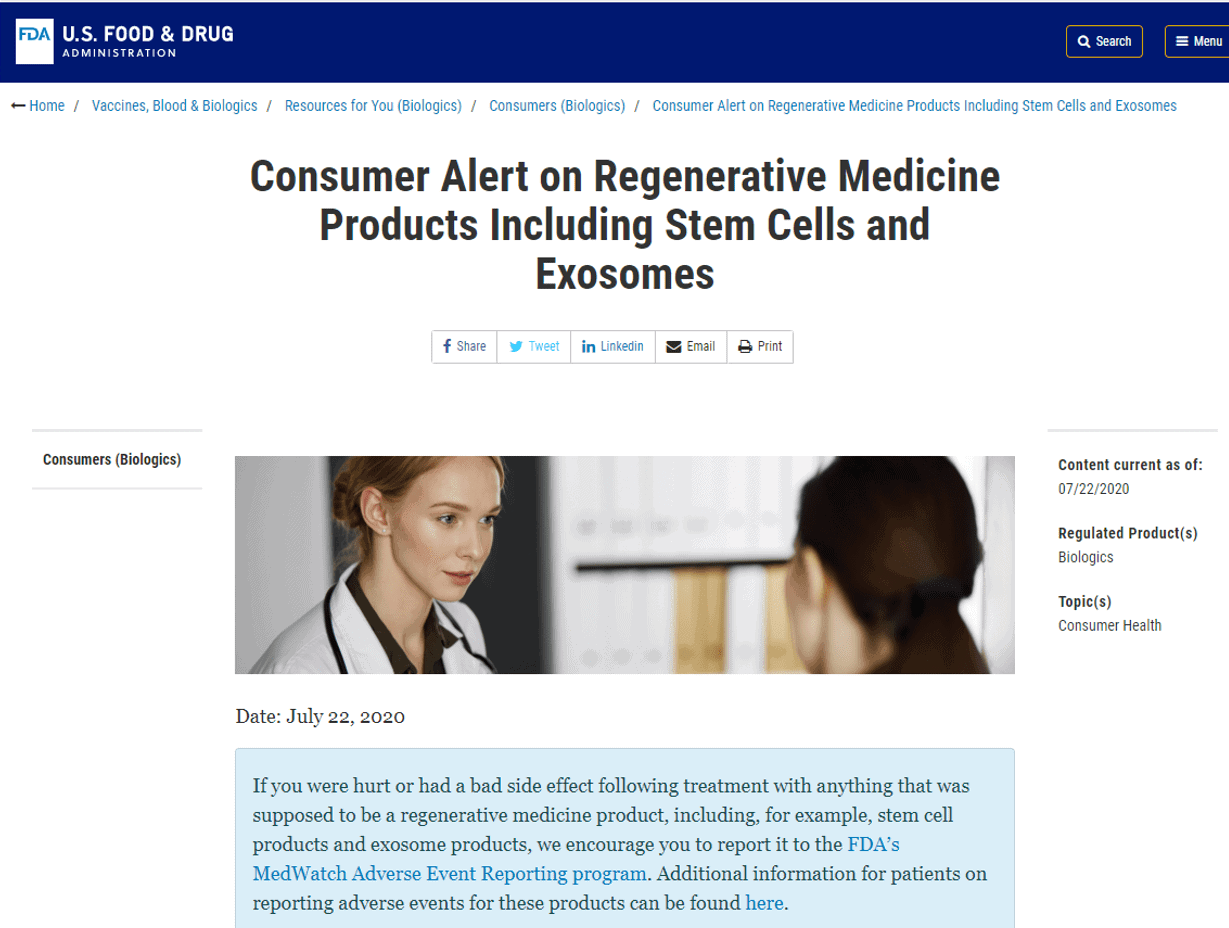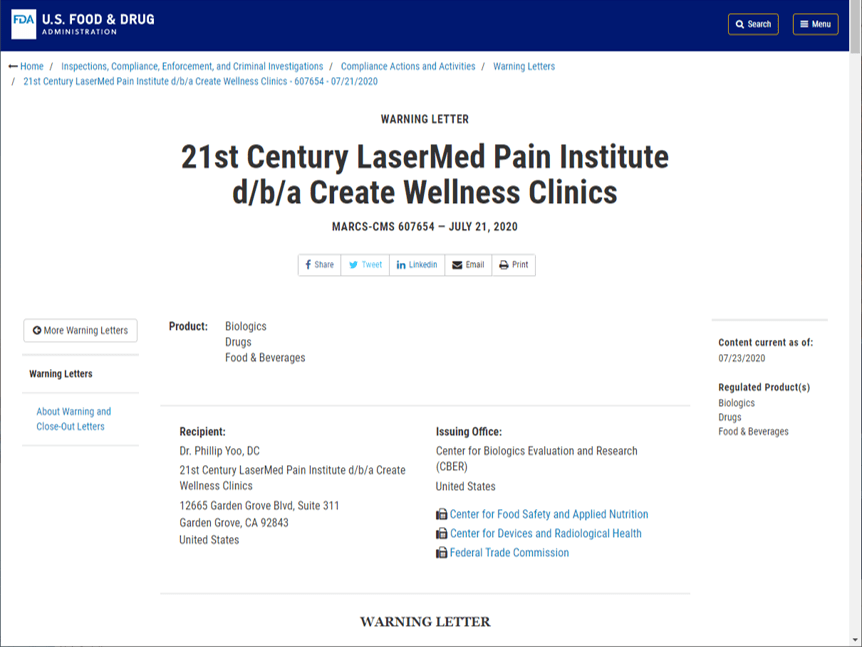FDA Clarifies It’s Position on “Stem Cell” Bad Actors
The FDA has been active in issuing “Consumer Alerts” recently. A new one issued this week was mostly missed by even ardent regulatory watchers. This extremely important document makes it very clear which orthobiologics are and are not legal. Let’s dig in.
The NEW FDA Consumer Alert

The FDA just issued a “Consumer Alert on Regenerative Medicine Products Including Stem Cells and Exosomes” on July 22nd which is one of many such public warnings and letters that have been issued these past few years. What’s interesting about this one is that it’s not just another shot across the bow, but is spells out everything the FDA finds to be an unapproved drug product.
What’s NOT Legal?
The FDA spells out right here what’s NOT legal:
“Anyone considering the use of anything purported to be a regenerative medicine product, including stem cell products, exosome products, or other widely promoted products such as products derived from adipose tissue (this product is also known as stromal vascular fraction), human umbilical cord blood, Wharton’s Jelly, or amniotic fluid should know:
- None of these products have been approved for the treatment or prevention of COVID-19, acute respiratory distress syndrome (ARDS), or any other complication related to COVID-19.
- None of these products have been approved for the treatment of any orthopedic condition, such as osteoarthritis, tendonitis, disc disease, tennis elbow, back pain, hip pain, knee pain, neck pain, or shoulder pain.
- None of these products have been approved to treat any neurological disorder, such as multiple sclerosis, amyotrophic lateral sclerosis (ALS; Lou Gehrig’s disease), Alzheimer’s disease, Parkinson’s disease, epilepsy, or stroke.
- None of these products have been approved for the treatment of any cardiovascular or pulmonary (lung) diseases, such as heart disease, emphysema, or chronic obstructive pulmonary disease (COPD).
- None of these products have been approved to treat autism, macular degeneration, blindness, chronic pain, or fatigue.”
Hence, the FDA created the illegal product list:
- Exosomes
- Adipose stromal vascular fraction
- Umbilical cord blood
- Wharton’s jelly
- Amniotic fluid
It also stated that these products can’t be used to treat any of the following diseases:
- COVID-19
- Orthopedic conditions
- Neurologic disorders
- Cardiovascular or pulmonary disorders
- Autism
- Macular degeneration/blindness
- Chronic pain
- Fatigue
What’s Likely Legal?
Note that three things were kept off this comprehensive list:
- Platelet-rich plasma (PRP) and blood products
- Bone marrow concentrate (BMC, BMAC)
- Fat grafts (Micro-fragmented fat, Mfat)
This fits with the concept that all of these are autologous (taken from the same patient in which they are used), minimally manipulated, and now more commonly used in surgeries or as a stand-alone injection in orthopedic care.
However, I would NOT use these autologous products to treat something other than orthopedic injuries without an IRB approval and a “no-charge” randomized controlled trial. For example, it’s my educated guess that advertising that you are using these autologous products to treat neurologic conditions will draw the same negative response from the FDA as above. Meaning that straying out of orthopedic care lane is likely a bad idea.
The fact that the above orthobiologics are not on this “illegal list” is also consistent with the agency’s prior statements that it would give orthopedic treatments a wider birth under “regulatory discretion”. Let’s dive deeper into that topic.
What is Regulatory Discretion?
As noted above, the agency had decided to give treatments for orthopedic injuries what’s called “regulatory discretion”. What’s that? The FDA regulates drugs and devices and sometimes that overlaps with the practice of medicine. When it does, the agency can choose to act or it can also choose not to regulate. When it doesn’t want to regulate, it’s called regulatory discretion.
A good example of existing codified FDA discretion is the “Mammography Quality Standards Act“. This is a program whereby the FDA can accredit certain organizations to in turn accredit mammography centers. These third-party accrediting bodies ensure that the individual clinical sites offering mammography have high standards and stick to the rules. This formalized discretion also takes the burden off the FDA from having to surveil thousands of clinic sites around the country that offer breast cancer screening.
The FDA and the Limits of Orthopedic Regulatory Discretion
Realize that the regulation of orthobiologics is fluid right now. For example, reading the tea leaves last year, several sales reps of birth tissue products floated the idea that the FDA would allow birth tissue vendors to use their placental and umbilical cord tissues to treat orthopedic conditions as part of regulatory discretion. However, because of the abuse in that space by manufacturers, sales reps, physicians, and integrative health clinics, the FDA has now removed birth tissues as part of its orthopedic regulatory discretion.
A Significant Change in the FDA’s Approach toward Clinics
The above FDA Consumer Alert is great because it clearly outlines what’s not legal right now. None of this is really new information, as it’s been in various past Warning Letters and other FDA communications, but not ever in one place. However, if you want to know what’s coming down the pike this year and next, the place to find that information is often in Warning Letters.
So what can be gleaned from the FDA’s most recent spate of Warning Letters? A significant change in the agency’s approach toward providers and clinics. Take for example this FDA “Mega-Warning” that went out this week:

This letter shows some recent trends and some new ones:
Provider Focus-A Recent Trend
This is a Warning Letter to a chiropractic clinic. The FDA and other federal agencies reviewed the claims made on the clinic’s website. However, note this sentence from the Warning Letter:
“The FDA has observed that you offer an umbilical cord derived stem cell product for sale in the United States and that this product is intended to mitigate, prevent, treat, diagnose, or cure COVID-19 in people.”
Hence, the FDA is holding the medical provider, who is the purchaser and user of a product manufactured by another party responsible as if they were the manufacturer of the violative product. For example, this sentence from later in the letter:
“Your product is also an unlicensed biological product.”
In fact, the FDA refers to “your product” some 18 times in the letter. Again, this is despite the fact that this clinic is not manufacturing any of the products it’s advertising and rebranding (umbilical cord “stem cells”, exosomes, COVID-19 test kits, and IV vitamin regimens).
Multi-Agency-A New Trend
Notice that four federal agencies are on this letter:
- FDA-CBER
- FTC
- FDA-CDRH
- FDA-CFSAN
Just the one-two punch of the FDA and FTC is scary. For example, it’s my understanding that responding to an FTC complaint could cost 6 figures by itself. Also, note that CDRH is on here because of the COVID test kits and CFSAN is involved because of the IV vitamin treatment protocols and treatment kits.
The FDA is Stopping the Birth Tissue “Stem Cell” and Exosome Train
If you’re a manufacturer, sales rep, or clinic advertising and using umbilical cord “stem cells”, amniotic or placental derived “stem cells”, or exosomes, these are all illegal drug products without approval. Hence, you need to CEASE and DESIST now. There is no doubt that you are violating federal law and are criminally liable if you continue to knowingly break the law.
Regulatory Discretion for Birth Tissues?
The FDA has generally left birth tissue vendors alone that:
- Don’t claim that their product has living stem cells
- Don’t claim specific clinical indications for the product
- Don’t more than minimally manipulate the tissue
While this has been a thin line on which to color inside, many birth tissue vendors have successfully colored within these lines. The FDA here is clearly targeting those manufacturers who have headed the opposite direction to boost sales. Those that do claim that their products contain stem cells, who often list specific uses for the product like osteoarthritis, and who may or may not more than minimally manipulate the tissue. In addition, they have now lumped clinics and providers into the same boat as these manufacturers who are coloring outside the lines.
Advice for Providers and Patients
If you’re a clinic using these products in these ways, you can be targeted and treated as a manufacturer. What that means is that the FDA can inspect your clinic site as if you are a Pfizer drug factory manufacturing millions of medication doses a month, an inspection that any medical clinic will fail miserably. In addition, the FTC will also likely file a complaint as well. Hence, your legal costs to defend yourself could run hundreds of thousands of dollars.
If you’re a patient that is receiving umbilical cord “stem cells” or exosomes, you may find yourself smack dab in the middle of an epic battle. You may have your appointments canceled, even though you prepaid for care. You may also be in the clinic when the feds show up.
The upshot? This new FDA Consumer Alert this week is a big deal that seems to have gone largely unnoticed. It’s unique because it’s a rare look into FDA’s thinking on orthobiologics that puts all of the critical information in one spot. In addition, take note of the significant change in FDA Warning Letters. The agency is now treating clinics like manufacturers and is working with other federal agencies to go after “bad actors”.

NOTE: This blog post provides general information to help the reader better understand regenerative medicine, musculoskeletal health, and related subjects. All content provided in this blog, website, or any linked materials, including text, graphics, images, patient profiles, outcomes, and information, are not intended and should not be considered or used as a substitute for medical advice, diagnosis, or treatment. Please always consult with a professional and certified healthcare provider to discuss if a treatment is right for you.
